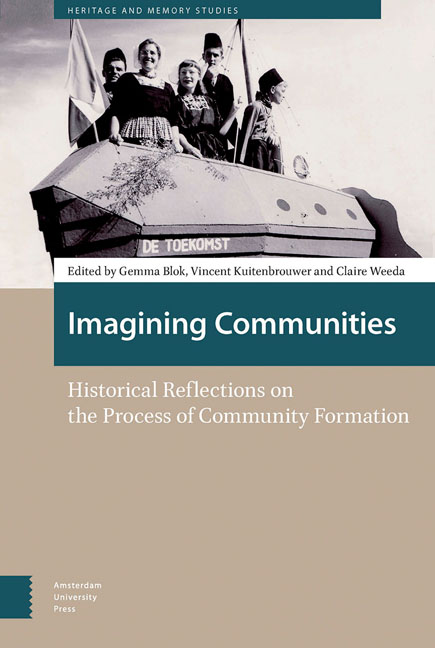Book contents
- Frontmatter
- Contents
- List of Figures
- Introduction
- 1 Meanwhile in Messianic Time: Imagining the Medieval Nation in Time and Space and English Drinking Rituals
- 2 Diverse Origins and Shared Circumstances: European Settler Identity Formation in the Seventeenth-Century Plantation Colony of Suriname
- 3 Imagining Europe: The Peace of Ryswick (1697) and the Rise of European Consciousness
- 4 Gypsy Music and the Fashioning of the National Community
- 5 ‘Tired, Worried and Overworked’: An International Imagined Community of Nervous Sufferers in Medical Advertisements, 1900-1920
- 6 ‘From Heart to Heart’: Colonial Radio and the Dutch Imagined Community in the 1920s
- 7 Indonesian Nationalism in the Netherlands, 1920s-1930s: Long-Distance Internationalism of Elite Pilgrims in Homogeneous, Empty Time
- 8 Time, Rhythm and Ritual: Imagined Communities in L’espoir (1937) and Les sept couleurs (1939)
- 9 Stamverwantschap and the Imagination of a White, Transnational Community: The 1952 Celebrations of the Jan van Riebeeck Tercentenary in the Netherlands and South Africa
- 10 ‘L’Oranie Cycliste, une grande famille’: Recycling Identities and the Pieds-Noirs Communitas, 1976-2016
- 11 Remembering and Imagining the National Past: Public Service Television Drama and the Construction of a Flemish Nation, 1953-1989
- Index
3 - Imagining Europe: The Peace of Ryswick (1697) and the Rise of European Consciousness
Published online by Cambridge University Press: 11 December 2020
- Frontmatter
- Contents
- List of Figures
- Introduction
- 1 Meanwhile in Messianic Time: Imagining the Medieval Nation in Time and Space and English Drinking Rituals
- 2 Diverse Origins and Shared Circumstances: European Settler Identity Formation in the Seventeenth-Century Plantation Colony of Suriname
- 3 Imagining Europe: The Peace of Ryswick (1697) and the Rise of European Consciousness
- 4 Gypsy Music and the Fashioning of the National Community
- 5 ‘Tired, Worried and Overworked’: An International Imagined Community of Nervous Sufferers in Medical Advertisements, 1900-1920
- 6 ‘From Heart to Heart’: Colonial Radio and the Dutch Imagined Community in the 1920s
- 7 Indonesian Nationalism in the Netherlands, 1920s-1930s: Long-Distance Internationalism of Elite Pilgrims in Homogeneous, Empty Time
- 8 Time, Rhythm and Ritual: Imagined Communities in L’espoir (1937) and Les sept couleurs (1939)
- 9 Stamverwantschap and the Imagination of a White, Transnational Community: The 1952 Celebrations of the Jan van Riebeeck Tercentenary in the Netherlands and South Africa
- 10 ‘L’Oranie Cycliste, une grande famille’: Recycling Identities and the Pieds-Noirs Communitas, 1976-2016
- 11 Remembering and Imagining the National Past: Public Service Television Drama and the Construction of a Flemish Nation, 1953-1989
- Index
Summary
Abstract
This chapter focuses on the European community as it was imagined in 1697 by Dutch authors celebrating the Peace of Ryswick. The aim is threefold. Firstly, to show that the concept of ‘imagined community’ can be stretched in a temporal way, as it provides us with a useful tool to discern the rise of imagined communities, more particularly the rise of national and European communities, in the early modern period. Secondly, to demonstrate that the European community was imagined in a variety of ways and dispersed into several different imagined communities that were defined by in- and exclusion of other denominations. Thirdly, to show that there was a strong interplay between the national and European levels. A close reading of the Dutch writings published to celebrate the Peace of Ryswick reveals that these publications expressed a strong sense of a shared European identity. Nevertheless, the majority primarily served as a means to propagate national sentiments, supporting the political and religious views of King/Stadtholder William III. History played a key role in the creation of this Dutch sense of exceptionalism within a larger European framework.
Keywords:Peace of Ryswick, national identity, Europeanism, imagined community, Dutch history, King/Stadtholder William III
Europe, world's pride, whose heart was trampled
by infuriated plagues of war
plunged into a sea of disasters,
buffeted from day to day by thundering gusts
in the crashing of the breakers against the coast
wounded by the murder weapon, sinks powerless down to the earth
[…] Ah! She calls […]
I descend in the eternal grave, my glory has gone.
With this dramatic scene the Dutch bookseller and poet François Halma opened his ode to the Peace of Ryswick in 1697. Europe is about to descend into the grave: all her powers are gone, and her former glory has vanished. All hope seems to be lost, but then the poem takes a new turn. Europe begs the princes and rulers of Europe to stop shedding their fellow Christians’ blood. Instead they should join forces to combat their common enemy, the Turks. In the end, Europe's wish is fulfilled: the European leaders make peace at Ryswick, and a new period of prosperity dawns. What is more, Europe forecasts a bright future, in which Istanbul, the Islamic capital of the Ottoman Empire, will once again fall into Christian hands.
- Type
- Chapter
- Information
- Imagining CommunitiesHistorical Reflections on the Process of Community Formation, pp. 59 - 76Publisher: Amsterdam University PressPrint publication year: 2018



